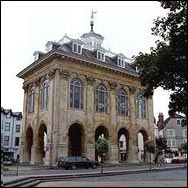
I’M planning a return to my roots – a trip to the UK.
My departure from the antipodes isn’t exactly imminent, but I will be in Ol’ Blighty by Christmas.
Apart from the fact I want to live and work there for career and cultural reasons, some of the reason for my life-long fascination with the UK is history. Not just 1066 and all that or seeing Big Ben, the place where Mary’s gullet was irrevocably severed or the spot where Wembley Stadium used to be before Multiplex went international… but also my personal history. Family history.
It’s always been an interest of mine so I’ve quizzed my grandparents for information mercilessly over the years. Today I have been researching the lands of my maternal grandmother.
The Hill’s lived in what was Berkshire, but is now Oxfordshire, near a place called Abingdon. In researching this town, and other smaller localities like Didcot, Blewberry and Harwell, on the internet, I have discovered some disturbing news. This is not the romantic Darling Buds country I had imagined.
In fact the promotional picture for Didcot is the two great nuclear-looking smoke-stacks of the town’s coal-fired power station. As God is my judge, see for yourself - http://www.oxtowns.co.uk/didcot/home.html
This is not the sceptred isle set in a silver sea I had hoped for. (Either that or the Oxfordshire Tourism Marketing Board needs to be sacked wholesale and replaced with trained monkeys in red fez hats… “release the monkeys!”).
All the articles about the towns focus on how great these places used to be. They also tend to outline the fact that, not only do people not want to go to these places any more, but there is no way to get there.
Here is the entry for Abingdon – a slightly major centre.
“It was a flourishing town in the Roman period, which in turn gave way to a Saxon settlement…When Henry VIII dissolved the monasteries in 1538, Abingdon Abbey was the 6th richest in Britain,” the site says.
“In 1810 the Wilts and Berks canal arrived with Abingdon becoming a key link between such places as Bristol, London, Birmingham and the Black Country.
“In 1906 it was abandoned as the canal sides collapsed and the railways offered faster transport. The first link to the railway came in 1856 with a branch connection to Culham and subsequently via Radley. The local station closed in 1963.
“(Motoring company MG is) synonymous with fast, sporty two seater cars which were manufactured in Abingdon for 50 years until production ceased in 1980.”
At which point they fucked off up the M4, never to be seen again.
I’ve been worried about what I’m going to do for work when I get to the UK. But now I have found the solution. I’m going to approach the Oxfordshire Tourism Marketing Board and ask if I can re-write their website. I’ve re-jigged the entry for Didcot as an example, using some of my actual family history.
“The building of the Great Western Railway from London to the West Country sparked the growth of Didcot in the 19th century. It is now 160 years since the passing of the Act authorising construction of the line,” it will open.
“But it is only 60 years since Bolton Gray’s fishwife great grandmother spent the war flat on her back with her legs in the air, servicing any troops who called into the historic George Hotel for a refreshing ale.
“Her husband, who was fighting in France, got his own back by not returning to Didcot after the war and instead hooking up with some vichy madam moiselle and commencing a fresh breeding program.”
Saturday, May 20, 2006
A proposal for the Oxfordshire Tourist Board
Subscribe to:
Post Comments (Atom)



2 comments:
Ooh, i like the sound of your family
It sounds like your fmily aren't as reticent as Joyce, bless her heart.
Post a Comment